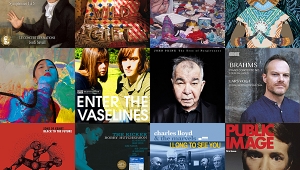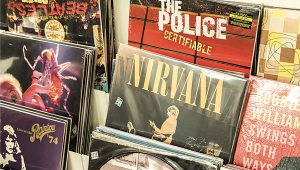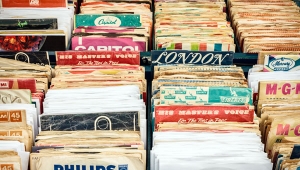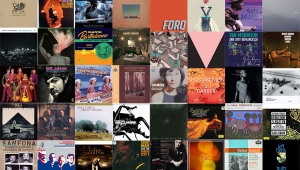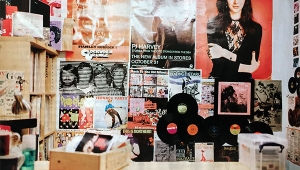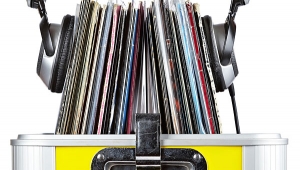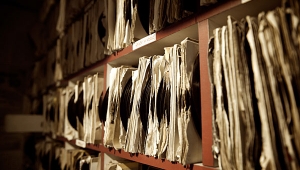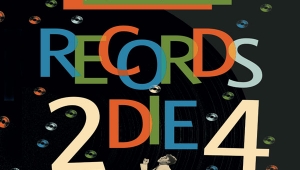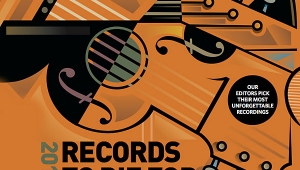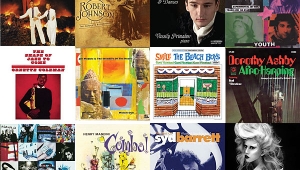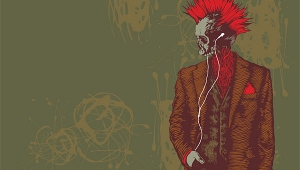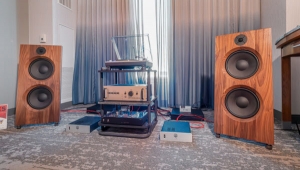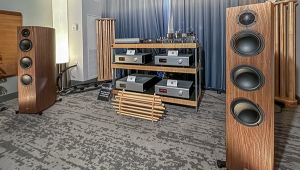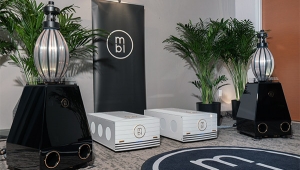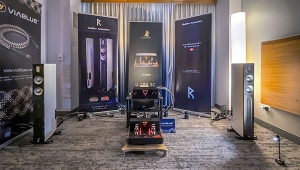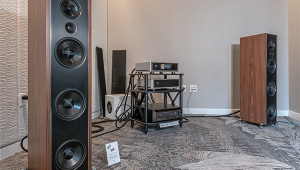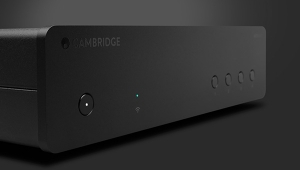| Columns Retired Columns & Blogs |
2006 Records To Die For
I sat down to write the introduction to the 2006 edition of Stereophile's annual "Records To Die For" extravaganza, and what popped into my head? Why, death, of course. After that, dead rock stars. What a concept. I mean, talk about dying for music.
CREAM: Royal Albert Hall, London May 2-3-5-6 2005
Reprise/Rhino R2 970421 (2 DVD-Vs). 2005. Martyn Atkins, video dir.; John Beug, exec. prod.; James Pluta, Scooter Weintraub, video prods.; William Bullen, video edit.; Simon Climie, audio prod.; Mick Guzauskie, audio mix; Bob Ludwig, audio mastering. Linear PCM (16-bit/48kHz) two-channel, DTS Surround & Dolby Digital 5.1 soundtracks. DDD. TT: 2:10:00
BEETHOVEN: The Late String Quartets, Vol.1
Yale String Quartet: Broadus Erle, Yoko Matsuda, violin; David Schwartz, viola; Aldo Parisot, cello
Artemis/Vanguard Classics 1205 (2 CDs). 1971/2003. , no prod., or eng. Listed. ADD.? TT: 99:00
JOHNNY CASH: Unchained
American 43097-2 (CD). 1996. Rick Rubin, prod.; Sylvia Massey, eng. AAD? TT: 43:46

After a recent stroll through a book about the graves of rock stars (see "Aural Robert," January 2006), I did a little web research and found out that rock stars die at an average age of 36.9. (For the rest of us, the average is 75.8.) Of the top 300 or so best-known dead rock musicians, 18 have been murdered, 3 electrocuted, and 5 drowned. Further, and, one suspects, influenced by the phrase "party like a rock star," 37 more died of "Misc. Medical" causes, and 21 others passed on to the great MSG in the sky for reasosn best left "unknown." As these figures prove, being a rock star ain't all deli trays and sexually transmitted diseases. It's a tough biz.
My definition of dead rock star is admittedly broad. Charlie Parker qualifies. So do Mozart, Fela, and Sam Cooke. Anyone brilliantly talented who lived fast, died (relatively) young, and left, as the song goes, a beautiful memory. Or, as a certain cartoon father would say, "a big, garlicky corpse."
But to be a dead rock star you must, at some point—preferably the beginning—have backed up your stardom with music. It's that kind of passion, of throwing yourself into the abyss night after night, that can wear you out. And it's that sacrifice, that art sustains and soothes us savage-breasted civilians.
Every year, we here at the leading high-end audio publication ask our writing staff—our own rock stars, if you will—to contribute short reviews of two recordings by those they deem rock stars that they couldn't live without. Anything—from unmarked white-label LPs (recordings from the, uh, so-called "gray area") to shiny new SACDs is fair game. Guilty pleasures—like, say, Pachelbel's Canon or anything by Ted Nugent, are welcome, as is the Original London Cast recording soundtrack from Mary Poppins (keep reading). Besides being invaluable as a musical Rorschach test of our writing staff's mental and emotional makeups (don't get me started), "R2D4" hopefully digs out a few records you hadn't thought of in a while—or, even better, had never heard of at all. While rock stars, breathing or not, may have all the fun (?) making the music, at least we get to listen. So welcome to our annual guide to what keeps us musically alive. Welcome to "R2D4," ca 2006.—Robert Baird
Note: If a recording listed here has previously been reviewed in Stereophile, whether in "Record Reviews," "Quarter Notes," or past editions of "Records To Die For," the volume and number of the pertinent issue appear in parentheses at the end of the review. For example, a listing of "(XXVII-3)" means that a review of the recording appeared in Vol.27 No.3 (March 2004).
JOHN ATKINSON
CREAM: Royal Albert Hall, London May 2-3-5-6 2005
Reprise/Rhino R2 970421 (2 DVD-Vs). 2005. Martyn Atkins, video dir.; John Beug, exec. prod.; James Pluta, Scooter Weintraub, video prods.; William Bullen, video edit.; Simon Climie, audio prod.; Mick Guzauskie, audio mix; Bob Ludwig, audio mastering. Linear PCM (16-bit/48kHz) two-channel, DTS Surround & Dolby Digital 5.1 soundtracks. DDD. TT: 2:10:00
ERIC CLAPTON & VARIOUS: Crossroads Guitar Festival
Reprise/Rhino R2 970378 (2 DVD-Vs). 2004. John Beug, David Horn, video exec. prods.; Ron de Moraes, video dir.; Mona Nimiec, Mitch Owgang, video prods.; Gary Bradley, editor; Elliot Scheiner, supervising audio eng.; Keith Winikoff, technical dir.; Simon Climie, Mick Guzauskie, Tom Bender, mix; Ed Cherney, Kooster McAlister, Greg Ondo, audio engs.; The Hit Factory, audio mastering. DTS Surround, Dolby Digital 5.1 soundtracks. DDD. TT: 3:30:00
When making my final choices for this year's listing, I was more than surprised to end up with two DVD-Videos of live concerts—no music CDs, SACDs, or DVD-As made my final cut. Yes, Cream's Albert Hall concert is also available on a 2-CD set (Reprise 9362-49416-2), but the CDs' sound is not significantly different from the DVDs' LPCM soundtrack, and while the CDs have the same concert program, they offer just one alternate take ("Sleepy Time Time") compared with the DVD's three ("Sleepy Time Time," "We're Going Wrong," "Sunshine of Your Love"). These three geezers amply demonstrate that all that is required for great music making is talent and empathy. Ginger Baker plays with mastery of time, while Eric Clapton demonstrates a consistent maturity in the construction of his solos that occasionally escaped him in the 1960s. I was fortunate enough to be at the Friday-night concert that contributes most of the material to this set, and I thought at the concert that only Jack Bruce was overshadowed by his playing of 37 years ago. That impression is reinforced by repeated playing of the DVD. Not that he doesn't play superbly—and the sounds of his Hartke-amplified Warwick fretless and Gibson EB-1 basses are way better than the fuzzy, midrangey Marshall stacks he used to use—but compared to his younger self, he tends to leave opportunities unexplored. But still, a concert to remember for a lifetime.
The Crossroads Guitar Festival DVD was released in 2004 and has stood up to repeated playings in the year since. Clapton is joined by a galaxy of guitar talent, ranging from the obvious—Billy Gibbons, B.B. King, Eric Johnson, Joe Walsh, Steve Vai, John McLaughlin, Carlos Santana, Robert Cray, Jimmie Vaughan, Buddy Guy—to the unexpected: David Hidalgo, Vince Gill, James Taylor, John Mayer, Dan Tyminski, Larry Carlton, Honeyboy Edwards, Hubert Sumlin, Robert Randolph, JJ Cale, Doyle Bramhall II. Not one of them phones it in. However, the stars for me are the many uncredited sidemen, led by the incomparable Booker T. and the MG's, with Steve Cropper. Recorded live at the Dallas Cotton Bowl, the sound has refreshingly wide dynamic range and some of the best live drum sound I have heard. Why can't studio-produced rock CDs sound this natural, this unforced, this good?
JIM AUSTIN
BEETHOVEN: The Late String Quartets, Vol.1
Yale String Quartet: Broadus Erle, Yoko Matsuda, violin; David Schwartz, viola; Aldo Parisot, cello
Artemis/Vanguard Classics 1205 (2 CDs). 1971/2003. , no prod., or eng. Listed. ADD.? TT: 99:00
BEETHOVEN: The Late String Quartets, Vol.2
Yale String Quartet: Broadus Erle, Yoko Matsuda, violin; David Schwartz, violin, viola; Walter Trampler, viola; Aldo Parisot, cello
Artemis/Vanguard Classics 1206 (2 CDs). 2004., no prod. or eng. Listed. DDD.? TT: 108:00
Though I've tried, I find it nearly impossible to identify what aspects of a performance cause it to speak more clearly than another. I don't know what makes the Yale String Quartet's recordings of Beethoven's late quartets so affecting. Nothing about these performances stands out, except perhaps the quality of the sound, and maybe that's the point: the Yale performers play it relatively straight and let the music speak for itself.
On the original four-LP boxed set (Vanguard Cardinal Series VCS 10101/4) I bought for $5 at Enterprise Records in Portland, Maine, the sound is superb: plenty of wood and rosin and a hint of ambience, just the way I like it. Those LPs are long out of print, but let us all praise used-vinyl stores and the amazing independent label Artemis, home of such acts as Better Than Ezra, Al Franken, The Baha Men, Steve Earle, Yoga Chant-Master Krishna Das, the North Mississippi All-Stars, and—thanks to Artemis's reissue of big chunks of the Vanguard catalog—the Yale String Quartet.
ROBERT BAIRD
JOHNNY CASH: Unchained
American 43097-2 (CD). 1996. Rick Rubin, prod.; Sylvia Massey, eng. AAD? TT: 43:46
It may be absence making the heart grow fonder, or emotional blowback from the new film about a small part of his life in which Joaquin Phoenix uncannily echoes some of his facial expressions, but Johnny Cash seems to have been in my CD player an inordinate amount this year. And while At Folsom Prison may be his Sgt. Pepper's and The Fabulous Johnny Cash his first coherent (and still great) album, it's Unchained, the second of his four albums produced by Rick Rubin, that recaptures and expands on the verve and sparkle that always made the man (in black) and his work so indispensable. With Tom Petty and the Heartbreakers as the backup band providing a loose feel that at times is almost jammy, alt-rock tunes such as Beck's "Rowboat" and Soundgarden's "Rusty Cage" mix well with spot-on versions of classics like "Sea of Heartbreak," "Memories are Made of This," and Cash's own Sun-era rockabilly number, "Country Boy." One of the final highlights in the career of a larger-than-life icon of popular music. (XX-2)
JO JO GUNNE: Bite Down Hard
Rhino 7722 (CD). 1973/2000. Bill Szymczyk, prod., eng.; Allen Blazer, asst. eng. AAD. TT: 38:54
Not sure if this one's worth dying for, but then, part of being a music lover is the guilty pleasures, and this nugget from the early 1970s is certainly that. Led by former Spirit members Jay Ferguson and Mark Andes, SoCal pop-rock band Jo Jo Gunne broke out in 1972 with the single "Run, Run, Run," from their self-titled debut. On Bite Down Hard, they blow away the sophomore slump with hooky, sweet-chorused, hard-rock–edged tunes like the opener, "Ready Freddy"; the hit that shoulda been, "60 Minutes to Go"; and such rave-ups as "Rock Around the Symbol" and "Take Me Down Easy." The arrangements are filled with weird breaks, keyboard effects that were then the state of the art, and lots of Matthew Andes' inventive guitar work. Does it sound dated? To a point, sure, but in a genre forever overloaded with forgettable fluff, these guys, as evidenced by this record, had a moment or two when the juices flowed. Now available on CD from Collector's Choice.
- Log in or register to post comments

